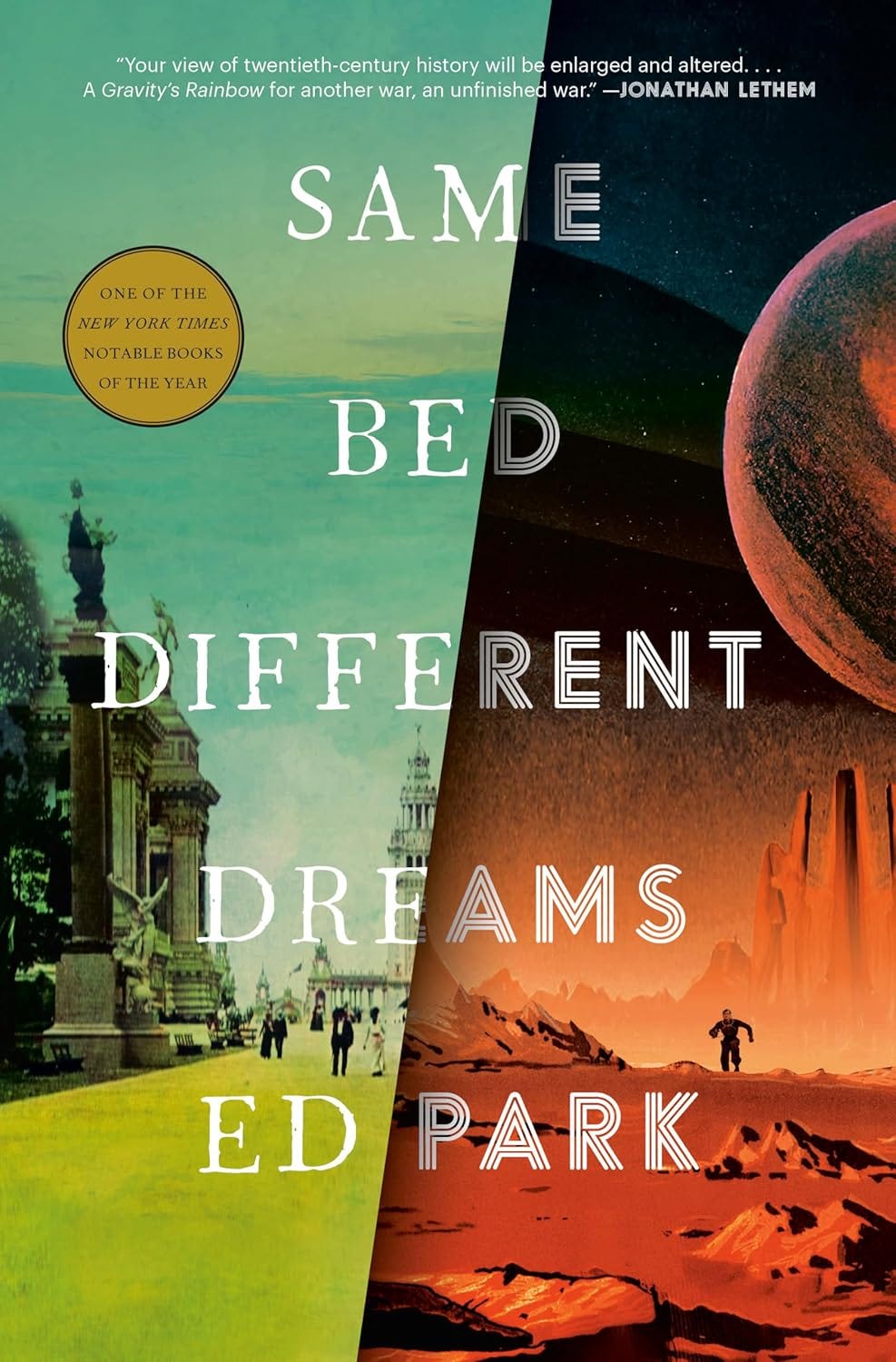Read enough encyclopedic novels and, eventually, your niche, non-literary interest will unexpectedly pop up in one. Yes, even yours! I say non-literary because there are plenty of things that pop up in books and bring a personal thrill – for me, my interests it’s any description of seaweed, or metafictional scenes of ekphrasis – but there are some things that seem to be on parallel lines with the world of literary fiction, never shall the twain meet, until, well, they do. Ed Park’s 2023 novel Same Bed Different Dreams is about a lot of things – an imagined alternate history of Korea, a rich vein of conspiracies and assassinations, tech conglomeration, a portrait of various 21st century families, and a questioning of history itself as a discipline and an idea – but it is also a text full of stuff that only a real, longtime Buffalo Sabres sicko would know and care about. Park, who grew up in Buffalo, has made a sprawling text of the end of history a la DeLillo’s Underworld, but with the Sabres as a locus, the Shot Heard Round the World replaced by No Goal. For a novel that is full of secret plotting, conspiratorial thinking, targeted messages, and uncanny coincidences (or are they?), every time my favorite hockey team came up – the comically inept Buffalo Sabres, a franchise that has never won a championship and has somehow missed the playoffs for fourteen seasons and counting, with no end in sight to either drought – I had the surreal experience of thinking: am I being fucked with? Am I in the middle of some plot too? Was this book made for me? To what end??
That’s solipsism, of course, though I’m not the only one to report an odd feeling of paranoia while reading Same Bed Different Dreams. Fiona Maazel, in Bookforum, reports that “someone I didn’t know took a picture—on the sly—of me reading [the novel], which seemed weird and suspicious. I got paranoid right away: Is Ed Park part of the Korean Provisional Government? Am I?” Such is the breadth and width of Park’s novel, which tangles so many lines of history as to catch anyone in its snare. That Korean Provisional Government (KPG) that Maazel mentions is the secret force propelling the novel, whether seen or unseen, real or imagined; the ‘real’ Korean Provisional Government was a mostly symbolic organization that disbanded sometime in the 40s, but what Park’s novel pre-supposes is: what if it didn’t? What if the KPG was covertly working “behind the scenes, laying the groundwork” for the unification of Korea amid a whole host of variously competing interests (Japan, China, Russia, the US), deploying double and triple agents across the globe (and across the DMZ)? And what if the way of working through this speculative gambit is a novel built out of three interweaving novels, one of which is a novel within a novel? Well, what then?? Stay with me here: Same Bed Different Dreams is made up of The Sins, wherein authorial stand-in Soon Sheen, an author turned long-tenured tech employee, discovers the existence of a controversial novel called Same Bed Different Dreams by a Korean author who goes by “Echo,” and undergoes a minor family crisis while being driven mad by the excerpts of Same Bed Different Dreams he reads; the actual text of Echo’s Same Bed Different Dreams, which is a broad alternate history of Korea as filtered through numbered capsule biographies and anecdotes about the KPG’s many members, a bit like if Sebald smoked a joint with Pynchon and riffed for a while; and 2333, a novel about an American fighter pilot, Parker Jotter, who spends a stint in a POW camp during the Korean war and then returns home to Buffalo and begins writing sci-fi novels (all with 2333 in the title, natch) that are suspiciously conversant with Korean myth and the aims of, you guessed it, the KPG. The Sabres are heavily involved. (Parker Jotter came up with the name; it’s the type of plane he flew in Korea.) Got all that?
Keep reading with a 7-day free trial
Subscribe to Evan Reads to keep reading this post and get 7 days of free access to the full post archives.





